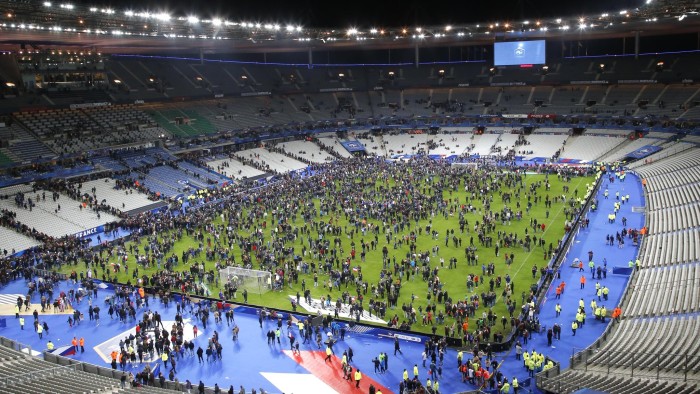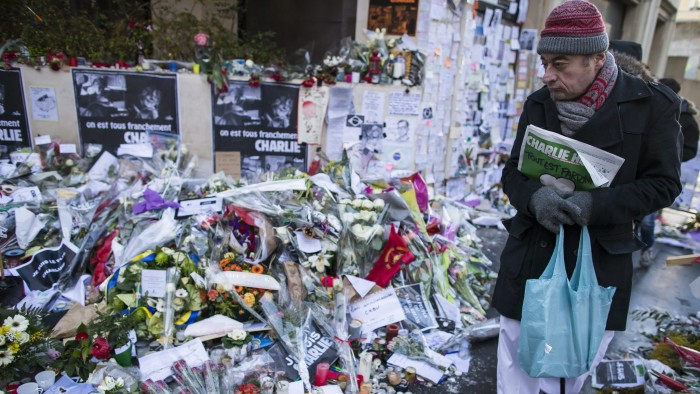Paris attacks: More than 120 dead in co-ordinated assaults
Roula Khalaf, Editor of the FT, selects her favourite stories in this weekly newsletter.
Paris was struck by co-ordinated attacks on Friday night, killing more than 120 people in one of the deadliest terrorist atrocities in a western capital city since September 11 2001.
The Paris prosecutor said in the early hours of Saturday morning that at least 120 people had died in attacks at six sites.
Officers were hunting for any accomplices but all the attackers were believed dead, said Michel Cadot, the city’s police chief. A spokeswoman for the prosecutor told the Associated Press eight attackers had been killed, seven in suicide bombings.
Key developments
● At least 129 people dead after co-ordinated attacks on at least six sites; 352 injured, including 99 severely.
● Investigation points to 3 different teams of terrorists
● 7 suicide bombers died in total
● 3 suicide bombers set off their explosives vests near the Stade de France — a Syrian passport belonging to an individual born in 1990 was found near one of them.
● 3 other attackers targeted Le Bataclan, a concert hall in central Paris where US band Eagles of Death Metal were playing.
● Gunmen in a black Seat car attacked restaurants and bars in the 10th and 11th arrondissements and later escaped.
● Another suicide bomber killed himself on Boulevard Voltaire.
● Security forces stormed the concert venue; two of the terrorists set off their explosives. The third one was shot.
● One of the Bataclan attackers was identified as a 29-year-old French citizen.
● A black Polo car used by the group was rented by a French individual residing in Belgium who was detained at the border on Saturday morning with 2 others.
● French president François Hollande declared a state of emergency, imposed border controls and sent troops to Paris.
● France closed other concert halls in Paris and its suburbs, as well as schools and universities this Saturday.
President François Hollande declared a national state of emergency, deploying the military around Paris and imposing border controls. Speaking to journalists outside Le Bataclan, a concert hall where many died, he pledged: “We are going to lead a war without mercy.”
He did not name the suspects, but said: “We know who they are, we know where they come from.”
The killings were the second major attack in Paris this year, following the terrorist assaults that hit the French capital in January when three Islamist extremists killed 17 in a series of attacks at weekly magazine Charlie Hebdo and a Jewish supermarket. It was the deadliest terrorist attack in western Europe since the Madrid train bombings in 2004.
It began in busy and popular areas of the capital at about 10pm local time. Attackers killed concertgoers and took hostages at Le Bataclan, a 1,500-seat music venue near Place de la République where the US band Eagles Of Death Metal was due to perform.
Two explosions rocked the Stade de France in northern Paris, where the French and German national football teams were playing, watched by Mr Hollande, who was swiftly taken away.
Witnesses also reported gunmen shooting at patrons in La Belle Equipe, a restaurant on Rue de Charonne in the 11th arrondissement. Two neighbouring restaurants by the Canal St Martin, Le Petit Cambodge and Le Petit Carillon, were also targeted.
Shondip Ghosh, a businessman from Mumbai who lives in California, was having dinner with three colleagues in a restaurant near the Bataclan when he heard gunshots. Shortly after, Mr Ghosh saw a man spattered in blood, who recounted how three gunmen had stormed the concert hall and started shooting indiscriminately. “This was meant to be our evening out,” the shocked businessman said.
Adam Thomson, a Financial Times reporter, heard automatic gunfire followed by two huge explosions near the Bataclan as security forces mounted their assault. A police source said at about 1am local time that the assault was over.
By about 2am local time at the Bataclan, groups of police dressed in black and carrying riot helmets, shields and heavy weapons were heading back to their vans. They appeared weary and walked in silence, refusing to answer questions.
“It’s horrific,” Mr Hollande said on television before security forces stormed the concert hall. “We are mobilising all the police force possible to neutralise the terrorists.”
The Paris police advised residents through social media to stay indoors. Several metro lines were closed.
Paris witness: Simon Kuper in the Stade de France

Tonight my family will probably be OK in Paris. But after that?
Read more
FT columnist Simon Kuper, who was watching the football match in the Stade de France, reported that about 20 minutes into the game, the sellout crowd — decked in red, white and blue for the match against the world champions — heard a loud explosion coming from outside the stadium.
There were a few cheers — a common response to a firecracker at a match. But a few minutes later another loud bang was heard, followed by police sirens, and it became apparent that these were not firecrackers.
The match continued and French fans did the Mexican wave, and exuberantly cheered the two French goals. At the end of the match, the stadium announcer informed the crowd that because of “incidents outside”, they could only leave by certain gates.
Many fans left the Stade de France but a couple of thousand walked on to the field, where they waited quietly, uncertain whether to go home, especially given the reports of shootings coming from central Paris. But within 45 minutes of the final whistle, almost all had vacated the stadium.
In a statement from the White House, US President Barack Obama said that the violence was “terrorism” and promised that the US would provide any help that France requested.
“We will do whatever it takes to work with the French people and nations around the world to bring these terrorists to justice,” he said. The attacks were an “outrageous attempt to terrorise innocent civilians”.

He added: “This was not just an attack on Paris and the people of France, but an attack on all of humanity and universal values we share.” Mr Obama later spoke about the attacks to Mr Hollande.
Even as the events in Paris were unfolding, officials and analysts said they were struck by how tightly co-ordinated the series of attacks seemed to be — a level of sophistication in planning and execution that has not been seen since the 2008 attacks in Mumbai.
Given the reluctance so far of western intelligence officials to say who was behind the attacks, it also appeared that there was little or no warning of the terrorist assault.
Adam Schiff, the leading Democrat on the US House intelligence committee, said the attack had all the signs of a terrorist operation.
State of high alert since Charlie Hebdo attack

Events in Paris amount to the sum of western intelligence agency fears
Read more
“Given the disturbing similarities to other attacks, this clearly co-ordinated series of violent acts bears all the hallmarks of international terrorism. Many hundreds of French citizens have travelled to Syria and Iraq, and the risk from those who return is well known and severe,” he said.
The fact that there appear to have been so many separate attacks on one night will raise uncomfortable questions for the French intelligence services.
British Prime Minister David Cameron tweeted that he was “shocked by events in Paris tonight”, adding, “our thoughts and prayers are with the French people”. He later announced he would chair a meeting of Cobra, the government’s security committee, on Saturday morning.
Germany’s Angela Merkel said she was “deeply shaken” by the attacks and that her thoughts were with the victims, their relatives and the people of Paris.
She has called an emergency ministerial meeting on Saturday to consider the implications for Germany of the Paris terror attacks.
She offered France “every support” in responding to the assaults, saying: “We will do everything to help with the hunt for the perpetrators and their backers and to lead together the fight against these terrorists.”
Iran’s President Hassan Rouhani cancelled his trip to the Vatican and Paris that was due to start on Saturday. Mohammad Javad Zarif, Iranian foreign minister, said the visit would happen “in a more appropriate time in the near future”.
Reporting by Anne-Sylvaine Chassany, Simon Kuper and Adam Thomson in Paris, Sam Jones in London, Geoff Dyer in Washington and Adam Samson in New York
Comments